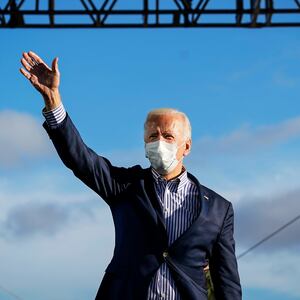So Joe Biden has officially won. But winning was, comparatively, the easy part. Building a roadmap for four years of Democratic policy in a divided Washington is a more challenging endeavor. Now Biden faces his first real test: How does a president elected by a geographically and ideologically diverse coalition of ex-Republicans, Democratic moderates, and young, nonwhite liberal activists manage to please everyone?
Even the Biden team seems unsure. In a Nov. 24 interview with NBC’s Lester Holt, Biden eagerly listed immigration as his top legislative priority, emphasizing the importance of reuniting 666 migrant children still separated from their families as part of Donald Trump’s inhumane “zero tolerance” immigration policy. But on Dec. 13, Biden’s team angered activists by failing to list immigration among his top four legislative priorities: COVID-19, economic recovery, racial justice, and climate change.
The omission, a Bidenland source told NPR, is an intentional acknowledgement that immigration reform has become too polarizing to take on immediately. The GOP will certainly remember that with enough noise from the conservative media, a “top priority” Biden issue can quickly find itself shoved to the bottom of the policy pile. And for a president who views himself as a “transitional candidate”—a one-term president, in other words—losing coveted priority status probably amounts to an early funeral for sensitive issues like immigration.
ADVERTISEMENT
Biden will need support from the left if he hopes to recover ground after such an early unforced error. An easy way to rebuild his credibility with disappointed progressives would be through a robust COVID-19 stimulus plan that emphasizes putting cash in the pockets of hurting American families instead of the big businesses raking in record profits.
A direct $2,000 monthly payment and a $15 national minimum wage, supported by two-thirds of Americans, ought to be non-negotiable features of the Biden stimulus. That isn’t as crazy as it sounds: just last month, Florida voters chose Donald Trump and a $15 minimum wage. If Democrats win two hotly contested special elections in Georgia this January, a legislative path opens up to provide long overdue income support to both out-of-work Americans and those struggling with unconscionably low hourly wages.
“If we win in Georgia, we can transition this country to a $15 minimum wage,” New York Rep. Alexandria Ocasio-Cortez told viewers during an Instagram Live stream. “We can make sure we expand peoples’ access to health care. We can make sure that we get a stimulus check that... isn’t just once a year.”
A Democratic majority would add incredible pressure on Biden to act for the millions of Black Americans who helped his campaign to victory in states like Michigan and Georgia. Racial equity is perhaps Biden’s best connection to the national progressive left, and addressing the challenges faced by America’s most marginalized racial groups is essential if Biden is serious about creating a more just and humane country.
“Especially when this campaign was at its lowest,” Biden told the country in his Nov. 7 victory speech, “the African American community stood up again for me. They always have my back, and I’ll have yours.”
Biden and his team understand that Republicans have long tried to boil down the expansive idea of “racial equity” into a frightening caricature. Trump has complained that Black voters didn’t appreciate his efforts at criminal justice reform, but he never understood that racial equity is about far more than just policing and criminal justice reform. It means ensuring economic and educational opportunity for young Black Americans. It means addressing systemic racism that many on the right refuse to even acknowledge by name.
For many young Black activists who have endured delays and setbacks on the path to racial equity, Biden’s presidency offers both the opportunity and the imperative to enact long-term policy changes.
“Biden has more to lose by not delivering for the people who delivered him the White House,” Virginia House of Delegates candidate and progressive activist Matt Rogers told me. “Those people are not the middle-of-the-road rural white voters. Those people are Black people, and he better not forget it.”
Every single priority policy area outlined by Biden—from environmental protection to infrastructure—must include meaningful racial equality components, and racial justice groups around the country have plenty of solid proposals for the Biden administration. How effectively Biden’s team incorporates those proposals will determine whether this new Democratic coalition survives long enough to challenge Republicans on the 2022 midterm electoral map.
If Biden wants to implement any of the sweeping social or economic changes demanded by the Democrats’ activist base, he’ll need to use moderate messengers who can massage progressive proposals into centrist language. That’s because Biden also needs to mollify skittish conservative suburbanites who only reluctantly abandoned Trump in November. If progressives want their victories, they’ll likely have to take them from a Cabinet lacking any top-tier liberal faces.
The Biden administration will test not only liberals’ ability to accept incremental victories that outwardly minimize the role of the activist left, but also Biden’s ability to recognize and pursue key progressive agenda items that challenge his own admittedly cautious approach to policy making. Without the political and moral courage to fight controversial policy battles over big issues like race, the Biden administration will find itself lacking the activist support necessary to translate a Democratic White House win into sustained electoral success. And it will depress turnout among the base in the next midterms, which could be fatal.
Joe Biden has waited his entire adult life for this moment. His success as president now depends on his ability to represent more than just his own political worldview. As the leader of the Democratic Party, President-elect Biden must center the activists and voters who saved our country from four more disastrous years of Trumpism.






